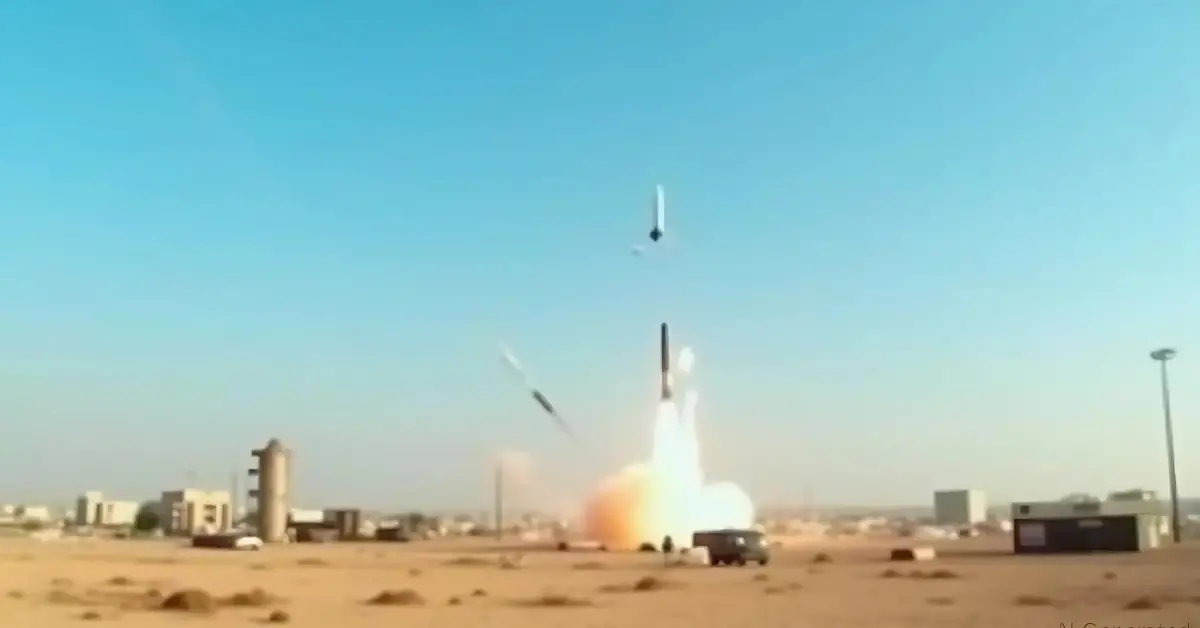Tensions in the Middle East escalated dramatically as Iran launched 100 drones at Israel, a direct response to a missile attack carried out by Israel. The drone strike has left markets reeling, and the international community is closely watching the developments, as this incident marks a sharp escalation in the ongoing conflict between the two nations.
The backdrop to this aggressive move by Iran lies in a series of escalatory steps taken by both countries. Israel, for its part, has been actively targeting Iranian military sites in Syria and other locations, accusing Iran of being a destabilizing force in the region. On the other side, Iran has repeatedly warned that it would not tolerate Israeli actions on its borders or in its neighboring countries, particularly as Israel has been accused of attacking Iranian military assets.
The Iranian drone strike is seen as a major shift in its tactics, signaling an increased reliance on unmanned aerial vehicles (UAVs) as a response to Israel’s missile strikes. Drones have been increasingly used by countries involved in conflicts across the Middle East, and this attack is likely to be viewed as a message not only to Israel but also to the global community. Iran has often criticized Israel’s military superiority, and this move underscores Iran’s desire to assert itself in a conflict that has already caused significant regional instability.
The attack has had a profound impact on global markets. The volatility that followed the drone strike has caused a ripple effect across various industries, from oil to tech. The Middle East remains one of the world’s most critical regions for global energy supplies, and any instability here often leads to sharp fluctuations in oil prices. Traders are now anxiously watching how the situation will evolve, as any further escalation could disrupt supply chains and increase the cost of energy worldwide.
In Israel, the situation is fraught with tension. The Israeli government has called the attack an act of aggression and vowed to take all necessary steps to protect its citizens. The military is on high alert, and Israel has promised to retaliate against any further attacks from Iran or its proxies. The use of drones marks a new phase in this ongoing war, where the technology of warfare is evolving rapidly, and the potential for unforeseen consequences is high.
The international response to this latest conflict is still developing. The United States, which has long been a close ally of Israel, has condemned the Iranian actions, calling them a violation of international law. The European Union has also expressed concern over the escalating violence and the threat it poses to regional stability. Diplomatic efforts are underway to prevent further violence, but with both sides in a standoff, there seems to be little room for dialogue at present.
This latest escalation follows a series of events that have fueled tensions in the region. From missile exchanges to cyberattacks, the relationship between Israel and Iran has deteriorated significantly in recent years.
Both sides are engaging in a dangerous game of brinkmanship, where small provocations could easily spiral into full-scale conflict. The involvement of other regional powers, such as Saudi Arabia, Hezbollah, and militia groups backed by Iran, complicates the situation further, as these actors have their own interests in the outcome of the Israeli-Iranian conflict.
For ordinary citizens, the effects of this conflict are far-reaching. In Israel, civilians are living under the constant threat of rocket attacks and airstrikes, while in Iran, citizens are facing the consequences of international sanctions that have crippled the country’s economy. The ongoing violence is also having a significant impact on the broader Middle East, with refugees fleeing areas of conflict and countries like Lebanon and Syria bearing the brunt of the humanitarian crisis.
While the situation remains tense, the broader question of what lies ahead for the Middle East remains uncertain. Will this latest attack trigger a larger military conflict, or will diplomatic efforts help de-escalate the situation? For now, the international community is hoping that the cooler heads will prevail, but with both sides digging in their heels, the path forward is anything but clear.
The Iranian drone strike on Israel marks a critical point in the ongoing conflict between the two nations. With markets rattled and the global community anxiously watching, the potential for further escalation remains high. As tensions rise, it is clear that the situation in the Middle East continues to evolve, and the world’s attention will remain firmly on the region as these developments unfold.




